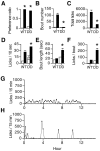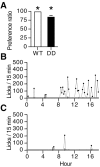Reward without dopamine
- PMID: 14645475
- PMCID: PMC6740991
- DOI: 10.1523/JNEUROSCI.23-34-10827.2003
Reward without dopamine
Abstract
Dopamine (DA) is believed to play a fundamental role in reward processes. Virtually all drugs of abuse activate dopaminergic systems, as do "natural" rewards such as sexual interaction and food. Sweet-tasting solutions, for example, are a well characterized natural reward. In the present experiments, we used mice that cannot make DA (DD mice) to test the hypothesis that DA is necessary for reward. Sucrose preference, assessed with a computerized "lickometer," was used to determine whether DD mice respond preferentially for rewarding stimuli. DD mice preferentially chose sucrose over water, and also preferred the noncaloric sweetener saccharin. Furthermore, the rate of licking, bout size, and length were greater in DD mice drinking sweets than in controls. These data refute the necessity of DA for the reward processes manifested by sucrose preference. However, DD mice initiated licking less frequently than control mice and had fewer total licks. We suggest that DD mice have a deficit of goal-directed behavior that is not specific to reward processes. Lastly, juvenile DD mice demonstrate robust sucrose preference before experience with food in the presence of DA. Thus, DA is not required for mice to learn to consume sweet solutions preferentially. We conclude that DA is not required to find the sweet tastes of sucrose or saccharin rewarding.
Figures




References
-
- Bailey CS, Hsiao S, King JE ( 1986) Hedonic reactivity to sucrose in rats: modification by pimozide. Physiol Behav 38: 447-452. - PubMed
-
- Bechara A, van der Kooy D ( 1992) A single brain stem substrate mediates the motivational effects of both opiates and food in nondeprived rats but not in deprived rats. Behav Neurosci 106: 351-363. - PubMed
-
- Berridge KC, Robinson TE ( 1998) What is the role of dopamine in reward: hedonic impact, reward learning, or incentive salience? Brain Res Brain Res Rev 28: 309-369. - PubMed
-
- Berridge KC, Venier IL, Robinson TE ( 1989) Taste reactivity analysis of 6-hydroxydopamine-induced aphagia: implications for arousal and anhedonia hypotheses of dopamine function. Behav Neurosci 103: 36-45. - PubMed
Publication types
MeSH terms
Substances
Grants and funding
LinkOut - more resources
Full Text Sources
Other Literature Sources
Molecular Biology Databases
